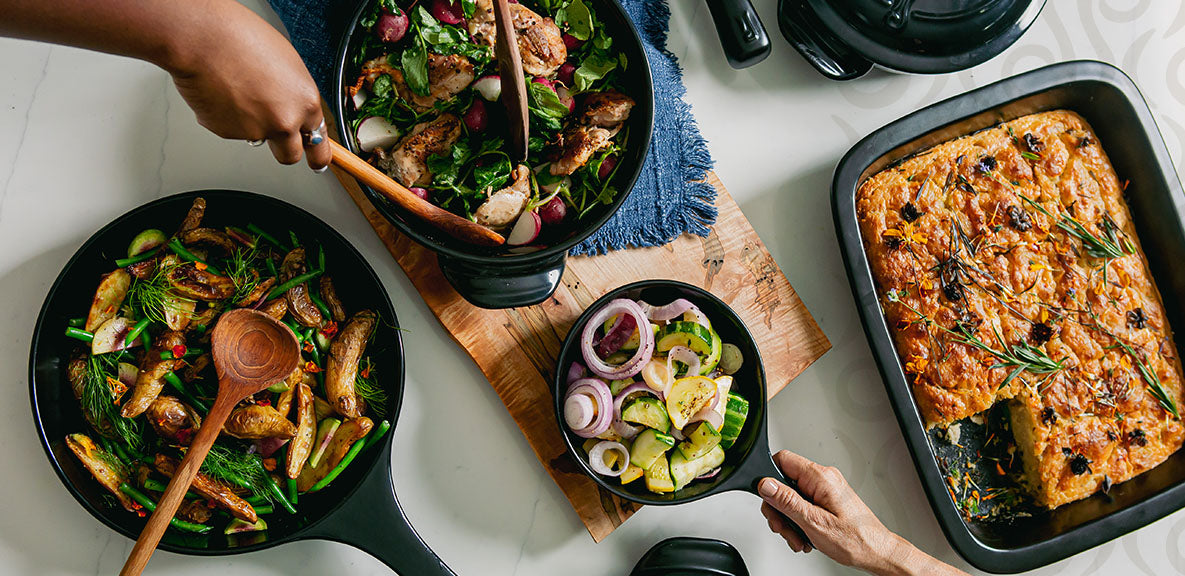
When you think of family meals, you may picture special occasions and holidays or Sunday lunch with Grandma's home cooking. Despite the happy memories family meals create, only around 30% of families eat together regularly. Gathering as a family to share a meal together provides an opportunity for everyone to connect with one another, have meaningful conversations and share experiences.
These are just a few reasons why family meals are important. We're also providing some tips for getting the family together around the dining table between work meetings and school activities so you can enjoy the benefits of family mealtime!
Benefits of Family Dinners
There are social, nutritional and intellectual benefits of having family dinners for both adults and children. The more frequently families eat home-cooked meals together, the more they thrive in these areas.
Social and Emotional Benefits
One of the emotional benefits of eating family dinners is that it creates a sense of unity and support within the family. Sitting down together allows for meaningful conversations and sharing experiences and traditions, creating lasting memories. Other benefits include:
- Improved relationships: Meaningful conversations lead to improved relationships and less conflict.
- Established routines: Children thrive with routines. When family meals form part of the routine, they provide a sense of security and belonging.
- Less stress: Finding time to eat with loved ones is a good way to reduce stress related to work or school, which may also relieve some family tension.
- Improved social skills: Family meals help children improve their social skills.
- Decreased risky behaviors: Teenagers who have frequent family dinners may be less likely to participate in high-risk activities.
- Better behavior: Mealtime provides a perfect opportunity to teach children good manners and social expectations at the dinner table.
- Higher emotional well-being: Family members who eat together regularly have higher self-esteem levels and are less likely to experience depression.
Nutritional Benefits

Another amazing benefit of eating home-cooked meals together is that families tend to consume more nutritious meals, including fruit, vegetables and whole grains. Plus, home-prepared meals contain less saturated fat, sugar and sodium than your average restaurant or takeout food. Other nutritional benefits of family meals to consider are:
- Healthy eating habits: Young children learn to eat healthy food by being exposed to them early and seeing how other family members enjoy it.
- Lower risk of health issues: Kids who eat regularly with their families are more likely to have healthy eating patterns, decreasing the risk of obesity, eating disorders and chronic illnesses.
- A healthier relationship with food: When children interact with food in a trusting and pressure-free environment, they cultivate a positive relationship with food and learn mindful eating as opposed to using food as a coping mechanism.
- Cooking skills: Involving children in meal preparation and choices gives parents an opportunity to teach them all about nutrition and cooking.
Intellectual and Academic Benefits
Family mealtimes offer unique learning opportunities for kids. By listening to explanations and narratives in conversations, children learn new words and expand their vocabularies. Additionally, family members benefit from:
- Improved grades in school: Children who have family dinners frequently perform better in their academics than those who don't.
- Intellectual stimulation: Family discussions around dinner encourage curiosity and critical thinking skills. With meaningful conversations, families can share experiences and knowledge across generations.
- Better communication: Conversations involve both talking and listening, which is necessary for developing communication skills one can use throughout life.
- Appreciation for diversity: Parents can encourage their children to be open-minded about new experiences and appreciate different cultures by trying out different cuisines and traditions.
- Improved common knowledge: Use family dinner times to discuss what's happening in the country or around the world. When you include your family members in discussions, they get to share their thoughts and expand their knowledge.
Practical Tips for Successful Family Meals
Family meals don't have to happen every day. Start with a few meals every week, whether you decide to eat breakfast, lunch or dinner together. Sometimes, we assume that family dinners have to occur on a weeknight, so we forget that eating breakfast or lunch together on the weekend is an option. Here are some practical tips to help prioritize regular family meals despite busy schedules.
Keep Mealtime Simple but Interesting
Depending on your family's schedule, mealtimes don't have to be elaborate affairs. Keep it simple yet interesting with these tips:
- Stick to tried-and-true recipes that you are comfortable preparing on weekdays.
- Serve a variety of healthy foods during the week to keep things interesting.
- Prepare and serve the same food for all family members.
- Experiment with or create your own recipes on the weekends.
- Explore meal themes, such as Meatless Mondays or Fish Fridays.
- Cook each family member's favorite meal on a rotating basis.
- Switch old recipe ingredients with healthier alternatives.
- Cook meals in bulk on weekends to lower meal prep during the week.
Make It Enjoyable
No matter how infrequent family meals are, you can make the most out of them by creating a positive mealtime environment and minimizing distractions to foster meaningful conversations. Here's how:
- Choose a location in your home where you'll have most of your family meals, whether in the dining room or on the patio.
- Enjoy positive and supportive conversations while eating and keep serious discussions for another time.
- Turn off or mute all electronic devices that can cause distractions and leave phones out of reach.
- Give every family member a chance to talk and express interest in their experiences.
- Enjoy everyone's company without rushing the meal or conversation.
Get the Family Involved
Family mealtimes may include enjoying a meal together, but there are other ways of getting the family involved and spending more time together. Let family members feel like they're part of the preparation process by letting them help:
- Create shopping lists.
- Choose new recipes.
- Prepare ingredients.
- Cook the meal.
- Set the table.
- Clean up after meals.
Doing these tasks together strengthens bonds and equips children with essential skills like collaboration and teamwork.
Elevate Your Family Meals With Xtrema
We know how important it is to enjoy family meals together. These traditions can create happy memories and lead to healthy benefits like a better relationship with food among kids. This is all why, at Xtrema, we strive to make healthy lifestyles and home cooking simple with beautifully handcrafted ceramic cookware that is 100% natural, non-toxic and worry-free. Our products are the ideal addition to any dining room table and more versatile than any other cooking material, whether you're preparing meals on the stove, in the microwave or over the campfire.
Browse our timeless ceramic collections or have a look at our current specials on select items.

